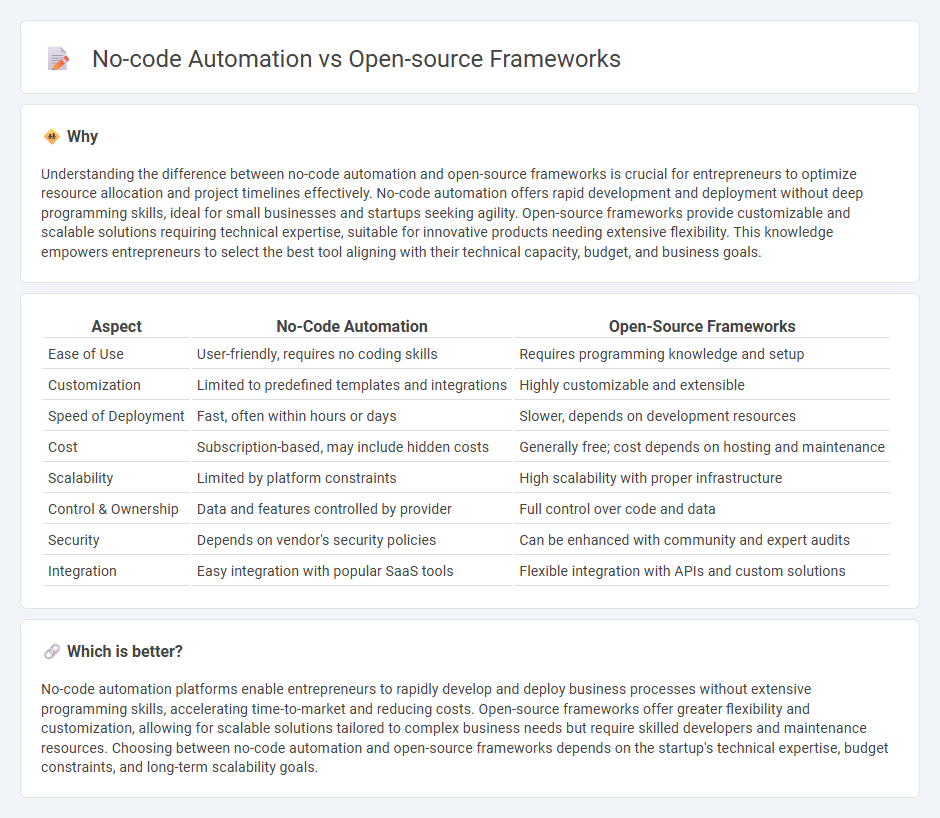
No-code automation platforms enable entrepreneurs to build and scale business processes quickly without extensive coding knowledge, reducing time-to-market and development costs. Open-source frameworks offer customizable, transparent, and community-driven solutions that empower startups to innovate with complete control over their software environment. Discover how choosing between no-code automation and open-source frameworks can shape your entrepreneurial journey and optimize your growth strategy.
Why it is important
Understanding the difference between no-code automation and open-source frameworks is crucial for entrepreneurs to optimize resource allocation and project timelines effectively. No-code automation offers rapid development and deployment without deep programming skills, ideal for small businesses and startups seeking agility. Open-source frameworks provide customizable and scalable solutions requiring technical expertise, suitable for innovative products needing extensive flexibility. This knowledge empowers entrepreneurs to select the best tool aligning with their technical capacity, budget, and business goals.
Comparison Table
| Aspect | No-Code Automation | Open-Source Frameworks |
|---|---|---|
| Ease of Use | User-friendly, requires no coding skills | Requires programming knowledge and setup |
| Customization | Limited to predefined templates and integrations | Highly customizable and extensible |
| Speed of Deployment | Fast, often within hours or days | Slower, depends on development resources |
| Cost | Subscription-based, may include hidden costs | Generally free; cost depends on hosting and maintenance |
| Scalability | Limited by platform constraints | High scalability with proper infrastructure |
| Control & Ownership | Data and features controlled by provider | Full control over code and data |
| Security | Depends on vendor's security policies | Can be enhanced with community and expert audits |
| Integration | Easy integration with popular SaaS tools | Flexible integration with APIs and custom solutions |
Which is better?
No-code automation platforms enable entrepreneurs to rapidly develop and deploy business processes without extensive programming skills, accelerating time-to-market and reducing costs. Open-source frameworks offer greater flexibility and customization, allowing for scalable solutions tailored to complex business needs but require skilled developers and maintenance resources. Choosing between no-code automation and open-source frameworks depends on the startup's technical expertise, budget constraints, and long-term scalability goals.
Connection
No-code automation platforms accelerate entrepreneurship by enabling founders to build and scale business processes without extensive coding knowledge, reducing time to market and development costs. Open-source frameworks provide customizable, transparent technology foundations that entrepreneurs can adapt to specific industry needs, fostering innovation and collaboration within startup ecosystems. Together, no-code tools and open-source frameworks empower agile, resource-efficient business models that drive rapid growth and competitive advantage.
Key Terms
Customizability
Open-source frameworks provide extensive customizability by allowing developers to access and modify source code, enabling tailored solutions to complex automation needs. No-code automation platforms offer ease of use with pre-built components but often limit deep customization and flexibility for highly specific workflows. Explore how customizing automation varies between open-source frameworks and no-code tools to determine the best fit for your project.
Technical Expertise
Open-source frameworks demand substantial technical expertise, including programming skills, system integration, and troubleshooting capabilities, enabling highly customizable and scalable automation solutions. No-code automation platforms minimize the need for coding knowledge, allowing users with limited technical backgrounds to design workflows through intuitive interfaces and pre-built modules. Explore the strengths of each approach to determine which best aligns with your organization's technical resources and automation goals.
Scalability
Open-source frameworks offer unparalleled scalability by providing customizable code bases that adapt to growing business needs and complex workflows. No-code automation platforms enhance scalability through user-friendly interfaces and pre-built integrations, enabling rapid deployment without deep technical skills but may face limitations as requirements become more sophisticated. Explore how choosing between open-source flexibility and no-code ease impacts long-term growth and operational efficiency.
Source and External Links
Build Faster with These Top 10 Open Source Frameworks - Dev Hunt - This article defines open source frameworks as reusable libraries that facilitate application development and lists the top 10 popular open source frameworks including React, Angular, Vue.js, Django, Rails, Express, Laravel, Spring, Flask, and React Native for web and mobile app development.
Top Open Source Frameworks | OpenLogic - The 2024 report identifies the top three open source frameworks as React.js, jQuery (considered here as a framework), and Angular 2 or newer, highlighting trends in developer usage and shifts in popularity across various programming languages and domains.
9 tried-and-true open source frameworks for development | TechTarget - A breakdown of established open source frameworks such as Django, Vue, Spring Boot, and AngularJS explains their strengths and targeted uses, emphasizing accessibility, rapid development, and community support for various programming needs.
 dowidth.com
dowidth.com